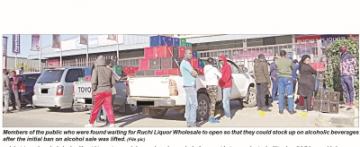TUCOSWA GIVES GOVT 3-DAY ULTIMATUM ON ALCOHOL BAN

MANZINI – The Trade Union Congress of Swaziland (TUCOSWA) has taken a swipe at government for its decision to ban the sale of alcohol for two months, starting next Wednesday.
The trade union federation has actually given government three days to reconsider its stance on the ban of alcohol sales.
TUCOSWA’s secretariat, through the Deputy Secretary General, Muzi Mhlanga, released a statement where it raised concerns over the manner in which government handled the issue of banning the sale of liquor for two months in the country.
The ban was announced by Prime Minister (PM) Ambrose Dlamini on Tuesday, where he said government had noted that alcohol consumption contributed to the high number of COVID-19 cases.
Stakeholders
Mhlanga said government should have engaged the relevant stakeholders in the liquor industry, including the tripartite (government, employers and employees) before announcing the ban. He said the federation viewed the ban as a disaster.
If government wanted to salvage the situation, Mhlanga said, it had three days, including today, to heed their call.
He said as a trade union federation, they were fully behind government in the fight against the outbreak and spread of COVID-19. He said they also had a task team that was assisting the country in the fight against the virus.
However, the deputy secretary general said government should have handled the issue of the ban differently. In fact, he said the ban was unnecessary and government should reconsider its decision, which the federation would investigate in order to get the rationale behind it.
Mhlanga said, according to their analysis, banning alcohol sales in the country would affect about 148 000 people. He said this was because each of the about 14 800 workers who would be on unpaid layoffs, had about 10 dependants directly and indirectly.
Affected
The 14 800 workers, who would be affected, come from the fact that there are 3 700 liquor licence holders under the Swaziland National Liquor Association and on average each of the liquor traders employs up to four people.
Therefore, Mhlanga said as a federation, they believed that government had a responsibility to engage the stakeholders, instead of taking a unilateral decision to ban alcohol sales. He said it was in that regard that they called upon government to put its decision on hold and discuss the matter with the stakeholders with the aim of coming out with a better solution, that would be a win-win for all.
He made an example that Eswatini Beverages had shown its willingness to educate and warn the public about how to prevent the spread of COVID-19 while enjoying their alcoholic beverages and the consequences of breaching the COVID-19 regulations.
“However, government did not bother to engage the company on how far it would go in that regard and then analyse the results before considering banning the sale of alcohol,” the deputy secretary general said.
Evidence
He also said government owed the nation empirical evidence to prove that alcohol was the leading cause for the spread of the coronavirus, as it was stated by the PM when he announced the ban on Tuesday at the Cabinet Offices.
“As a federation, we will investigate the matter because we need scientific evidence to prove what the rationale was behind the banning of alcohol sales in the Kingdom,” Mhlanga added.
In the absence of the empirical evidence to prove government’s claims in relation to the matter, Mhlanga emphasised that as a federation, they called upon government to reconsider its decision and go back to the drawing board by engaging the relevant stakeholders.
Moreover, the federation’s secretary general said they would not talk about issues of cushioning businesses and workers at the moment because they wanted government to handle the matter properly first. He said issues of cushioning businesses and workers could be only considered once government had handled the matter properly and empirical evidence that alcohol was one of the leading causes for the spread of the coronavirus was made available.
Meanwhile, Acting Government Press Secretary Sabelo Dlamini said he had not seen the federation’s concerns.
However, he said the Minister of Commerce, Industry and Trade, Manqoba Khumalo had responded to similar concerns the previous day.
He quoted the minister as saying; “Government is aware of the negative impact that COVID-19 has on businesses and we shall continue to work together with all concerned stakeholders to try to come up with solutions that may mitigate the effects of this pandemic on the economy.”
Reopen
It is worth noting that the Swaziland National Liquor Association (SNLA) highlighted that some liquor traders might not be able to reopen when government lifts the ban.
The association said this was because most businesses in the industry were swimming in debts and their landlords were threatening to kick them out of their structures.
Again, the association said the ban on alcohol sales could lead to a rise in sex work in the country. SNLA said this was because people were losing their jobs faster than the surge of the coronavirus.
The association also said it feared that the country would start counting more deaths caused by drinking unsafe alcoholic beverages, instead of COVID-19 which the world, including the Kingdom, was fighting.




 del.icio.us
del.icio.us Digg
Digg
Comments (0 posted):